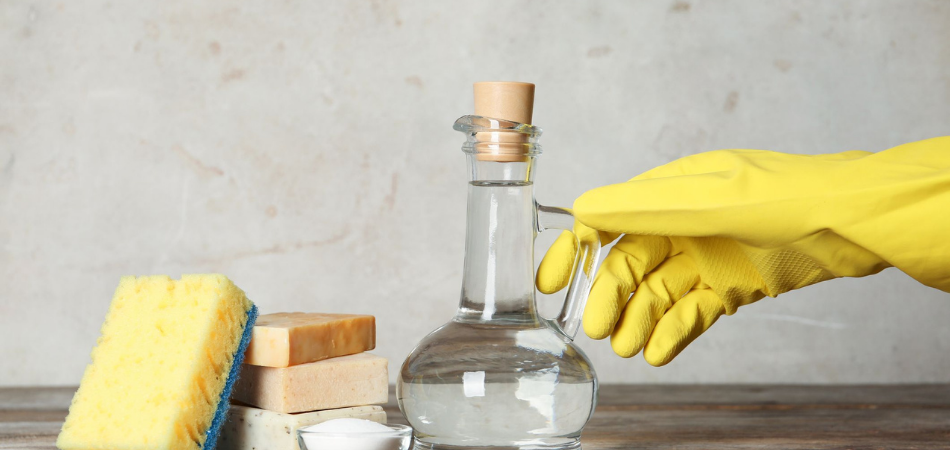Vinegar is one of the common household items. It is a liquid found in your kitchen with many uses, both culinary and nonculinary. For example, vinegar can be very useful if you want to remove rust from stainless steel. Vinegar contains acetic acid, and due to its chemical structure, it works well as an anti-rust agent. Therefore, does vinegar remove rust from stainless steel?
Yes, Vinegar can remove rust from stainless steel, but the process takes time. Vinegar baths loosen rust from the metal. Instead of stains, you are left with a clean, sparkling surface after rinsing with water.
You can also use white vinegar to remove rust on stainless steel for better results. Soak the items in white vinegar for some hours, and the vinegar will react with the rust and get it dissolved, then wipe the items to remove the rust.
There are ways to remove rust from metal, but one of the best is vinegar. Vinegar will dissolve even the most persistent rust, making it ideal for rusty antiques. Even if your stainless steel has discolored or shows other signs of corrosion, you may be able to remove these markings with vinegar and make your stainless-steel shine like new again.
As you read further, you will understand how rust occurs in stainless steel, how to remove rust from stainless steel with vinegar, and the precautions to take when doing that.
Contents
- Rust as a Type of Corrosion
- How Rust Occur in Stainless Steel?
- How Does Vinegar Remove Rust from Stainless Steel?
- Does Cleaning Stainless Steel with Vinegar Damage It?
- Does White Vinegar Affect Stainless Steel?
- Does White Vinegar Corrode Metals?
- Precautions to Take when Using Household Chemicals like Vinegar to Remove Rust
- Conclusion
Rust as a Type of Corrosion
Rust is the common name for iron oxide. It is a type of corrosion that usually occurs in iron, where iron or alloys like stainless steel alloy react with moist air or oxygen and water. If the water present during the chemical reaction is saltwater, then the stainless steel will rust faster.
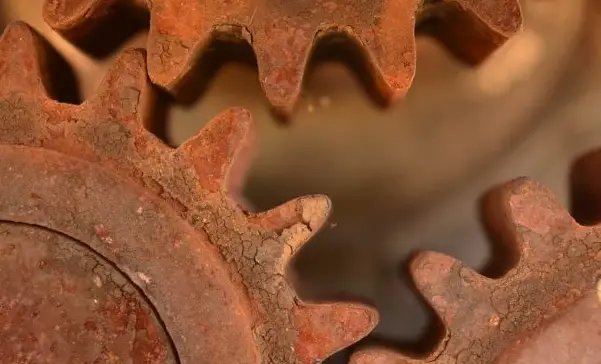
This photochemical process involves molecular movement where electrons move from iron molecules to oxygen molecules, thereby changing the metal composition and transforming it to oxides of iron.
Rusting is a natural phenomenon that can be noticed in the immediate environment because oxygen is found in every part of nature. It usually occurs gradually, but the presence of electrolytes like saltwater during the reaction will increase the rate at which the reaction takes place, thereby making the stainless steel or metal rust faster.
How Rust Occur in Stainless Steel?
Rusting or corrosion of stainless metals occurs in the presence of oxygen or moist air and water. When these two elements are present, oxygen will react with the ferrous part of the metal in the presence of water, forming oxides of iron that we normally see as rust.
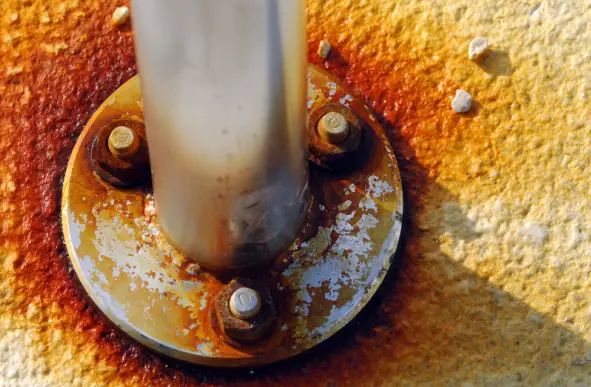
During the early stage, water will break the oxygen molecules that will hasten the reaction between oxygen and the metal; while iron loses electrons, oxygen absorbs them.
At the same time, the ferric ions present in the iron will react with water to produce hydrogen, ferrous hydroxide, and hydroxide. This hydroxide will further lose its water content to allow the iron to produce more compounds of iron which will make the stainless steel medal continue rusting.
All these above-explained reactions form those orange-brown particles you see on iron, and when these particles keep falling off, it will make way for the inner part of the iron to get attacked as well, leading to more rusting.
How Does Vinegar Remove Rust from Stainless Steel?
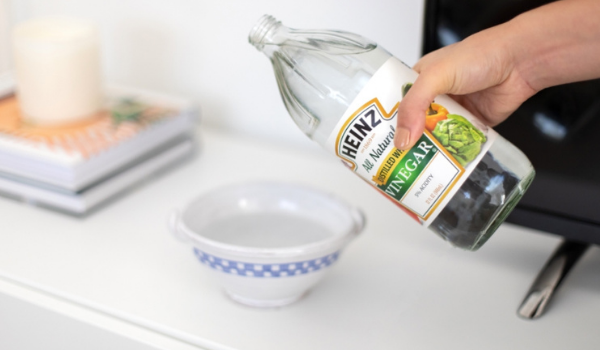
- To Remove Rust from the Surface of a Stainless Steel Item (Sink, Etc): Pour some quantity of vinegar on a soft fabric or scrub, and rub it on the surface of the stainless steel where the rust had appeared. Leave the vinegar on the spot for about five to ten minutes, then clean it off with cold water.
- To Remove Rust from a Household Item (Fork, Spoon, Knife): Dip the rusted item inside a diluted white vinegar. Allow the vinegar to soak the item for at least thirty minutes. Remove the item from the solution and clean it off with cold water.
Does Cleaning Stainless Steel with Vinegar Damage It?
Leaving some residue from cleaning solutions like vinegar can damage stainless steel. You must rinse and dry the item thoroughly before storage, or you can use a mixture of salt and baking soda dissolved in water to remove the remaining residues that might remain in crevices after soaking.
Do not leave stainless steel items to soak in vinegar, or solutions that contain table salt or chlorine for a long time, because excessive exposure of these items to such solutions can damage them.
Does White Vinegar Affect Stainless Steel?
Vinegar is a regular household cleaning item that a lot of people use in doing various types of cleaning in their homes.
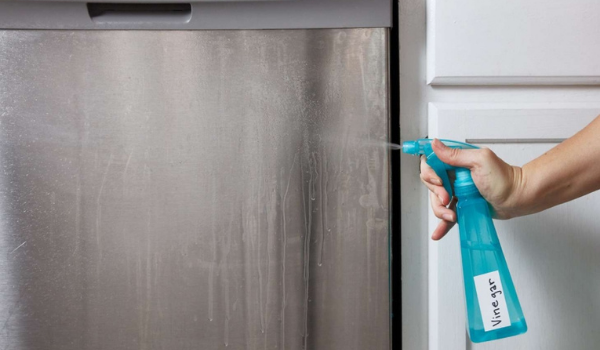
Technically, what white vinegar does is that it makes your stainless steel items free from dirt, dirty fingerprint marks, etc. The mild acid present in vinegar can easily clean most of your stainless steel items and get rid of rust stains if any.
Does White Vinegar Corrode Metals?
Yes, white vinegar can corrode metals because, at high temperatures, vinegar becomes acidic and concentrated. Even though it can be used to remove rust stains from stainless steel metals, you must always apply caution when making use of it.
Precautions to Take when Using Household Chemicals like Vinegar to Remove Rust
Household chemicals used in removing rust from household items are chemicals that are commonly made from phosphoric or oxalic acid, and therefore, can be dangerous to your skin.
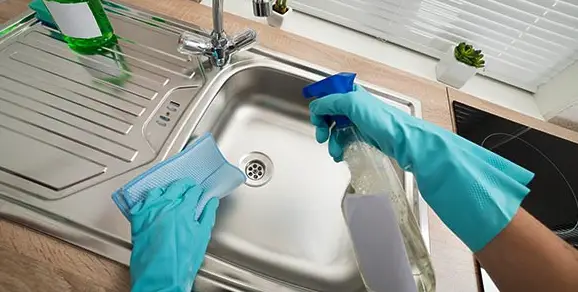
Here are some precautions you can take while using these chemicals at home:
- Ensure that you follow all instructions written on the body or manual of the rust remover while using it to remove rust from stainless steel or metallic objects.
- Carefully read the user manual thoroughly to get the guidelines on how to use the chemical to clean various household items, as the usage of the product differs from item to item.
- Also, remember that most of these household chemicals are expensive and can only be used on smaller household items.
Conclusion
Vinegar is one of the most powerful household chemical products that can be used to remove rust from stainless steel items. Soak the items in vinegar in a bowl for some hours or a day, remove, rinse thoroughly, and dry to prevent the vinegar residues from rusting them.
For items that cannot fit into a bowl, you can pour vinegar on the spot and leave for some minutes, then scrub with a soft fabric to achieve the desired result.

